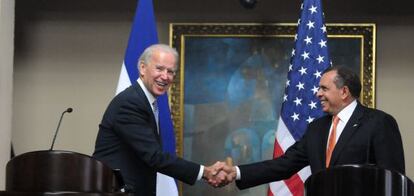VP Biden pledges to help Central American leaders in drug war
"No one country can defeat transnational crime alone," says politician

US Vice President Joe Biden promised Central American leaders Tuesday that Washington will "meet its shared responsibility" in helping their countries fight drug trafficking and related violent crimes that are causing instability in many government institutions.
"No one country can defeat transnational crime alone," Biden said at a news conference in Tegucigalpa, where he met the presidents of Honduras, Guatemala, Panama, El Salvador, Nicaragua and Costa Rica, as well as the foreign minister of the Dominican Republic.
"At home, in the United States, we're investing to reduce the demand for illegal drugs and to cut the illicit flow of money and weapons that contribute to crime and violence in the region - it is our responsibility."
Through the US government's Central American Regional Security Initiative, the vice president said that the Obama administration is asking Congress to allot an additional $107 million next year to the program. Since the initiative was introduced in 2008, Washington has disbursed some $361 million.
Recent studies have shown that cocaine use in the United States dropped by 37 percent between from 2006 to 2010. But in that same time period, there have been hikes in other narcotic use, such as synthetic drugs, up 56 percent; heroin, 18 percent; and marijuana, 40 percent.
Central America has become a major corridor for the Mexican drug cartels, who smuggle narcotics from South America. It has also brought an unprecedented wave of violent murders to the countries along that route, most notably Guatemala, where the homicide rate is the highest in the entire seven-nation region.
In an effort to curb the problem, Guatemalan President Otto Pérez Molina has called for an international debate over the legalization of some types of drugs. "The issue actually goes beyond just legalizing drugs. What we are calling for is a dialogue, a debate to look at other ways to fight drug trafficking efficiently," Pérez Molina was quoted as saying in the Tegucigalpa daily La Prensa.
The leaders of El Salvador, Panama and Honduras reject the legalization of narcotics while Costa Rica and Nicaragua say they are open to a debate.
Before arriving in Tegucigalpa, Biden said in Mexico City, where he met with President Felipe Calderón, that Washington would not change its policy over the illegalization of drugs. "It makes sense to debate it, but the Obama-Biden administration is not going to change its policy over legalization," the vice president said.
In Mexico, Biden also met with the presidential candidates from the nation's three major parties who will be running in the July 1 election.
In one controversial matter, Biden, according to a source, said the United States doesn't believe recent reports that the Institutional Revolutionary Party (PRI) - whose candidate Enrique Peña Nieto is leading presidential polls - is looking to do a deal with the country's biggest cartels in an effort to curb the violence. Peña Nieto's campaign chief Luis Videgaray told a radio station that Biden told the candidate that "the United States isn't afraid" because it is an "unfounded myth."
The speculation began late last year after some newspapers reported that factions within the PRI were favoring drafting agreements with the cartels as way of keeping the murder rate down.
Tu suscripción se está usando en otro dispositivo
¿Quieres añadir otro usuario a tu suscripción?
Si continúas leyendo en este dispositivo, no se podrá leer en el otro.
FlechaTu suscripción se está usando en otro dispositivo y solo puedes acceder a EL PAÍS desde un dispositivo a la vez.
Si quieres compartir tu cuenta, cambia tu suscripción a la modalidad Premium, así podrás añadir otro usuario. Cada uno accederá con su propia cuenta de email, lo que os permitirá personalizar vuestra experiencia en EL PAÍS.
¿Tienes una suscripción de empresa? Accede aquí para contratar más cuentas.
En el caso de no saber quién está usando tu cuenta, te recomendamos cambiar tu contraseña aquí.
Si decides continuar compartiendo tu cuenta, este mensaje se mostrará en tu dispositivo y en el de la otra persona que está usando tu cuenta de forma indefinida, afectando a tu experiencia de lectura. Puedes consultar aquí los términos y condiciones de la suscripción digital.








































